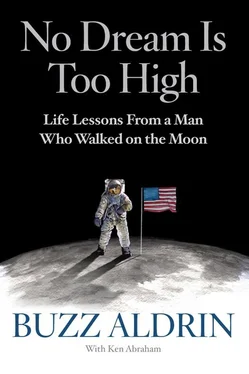Looking back at Earth from the Moon, a question darted across my mind: Where are the billions of people on that little marble that I’m looking at? It struck me that of all the human beings, living or dead, Neil, Mike, and I were the only three not there.
* * *

CHRISTINA AND I WERE TALKING recently about my age and the fact that one of these days, I am going to die.
“Yeah, and when you do, I want to send half of your ashes to Mars,” she said.
“Really? Which half?” I asked.
“Depends on what I’m mad about at that time,” she quipped. “But you can be sure of this, I’m going to send your ass to Mars!”
* * *

THE OATH I TOOK AS A TEENAGE BOY—“Duty, Honor, and Service to my country”—still permeates my thoughts today. Serving my country remains my paramount passion, and I’m constantly looking for new and better ways to do it.
Besides encouraging the next generation of space explorers, another of my priorities has been to help honor and better care for our country’s veterans—the men and women who have sacrificed so much so that our nation and world can live in freedom and peace. Certainly, I want to be of service to America’s space program, but I also want to continue to be of service to our veterans and our military.
In October 2012, Brian Jones, an explorer in his own right who has flown around the world in a hot-air balloon, called and invited me to Great Britain to help Aerobility, a UK charity that provides flying experiences to disabled people. Their plan was to raise money by engaging more than 50 celebrities to “fly” various lengths in a realistic cockpit simulating around-the-world flights. The idea piqued my interest, so I consented to help, and we raised a ton of money for the organization.
I flew my lengths and then popped out of the simulator completely exhilarated. I loved it! “Wow, the sense of accomplishment that I feel,” I said, “coming out of that cockpit … It is amazing.”
“You?” Christina asked. “Really? After all the flying you have done, you are excited about flying in a simulator?”
“Yes, it has been a while since I’ve flown, or even been in a simulator, and I’d forgotten how exciting it is to me. Plus, there are a lot of things that a pilot has to concentrate on … You really have to focus on what you are doing … airspeed … rate of climb … There are all sorts of things a pilot must do.” So it occurred to me that this could be a good thing for veterans who are suffering with post-traumatic stress disorder. Because one of the things they struggle with is getting out of themselves and focusing on something else besides their memories, this could be a way to help them get their minds off their problems and provide an enjoyable way to have a sense of accomplishment.
Two months later, Aerobility held the Aviators Ball, an event honoring individuals and groups connected to their cause. For instance, they gave an award to a man who has cerebral palsy and who learned to fly. Another man, wheelchair bound, learned to fly using special instrument panel adjustments, similar to those that some handicapped individuals use to drive an automobile.
When my turn came to address the crowd, I made a spontaneous, public commitment. “I have made a decision that I want to do what you are doing, but I want to focus on veterans in the United States.” There it was: I was on record.
I decided to call our organization U.S. Aerobility and to focus our efforts on creating opportunities for U.S. veterans, especially those with physical disabilities, so they can learn to fly. This organization has become near and dear to my heart.
We have already provided several combat veterans who are dealing with PTSD the opportunities to fly in a simulator, and then to fly in an actual plane. It takes concentration to fly, so when the vets discover that they can focus again, it opens whole new vistas of opportunity for them. If I can fly an airplane, what else can I do? they wonder.
In addition to U.S. Aerobility, I have been actively involved in raising awareness for veterans in another way. Until recently, when the national anthem was being played, the military hand salute was restricted to those in active service. In 2008, though, President George W. Bush signed a bill into law allowing veterans also to hand salute the flag, rather than simply putting a hand over the heart. It is a great way that other people can take note of and appreciate the veterans who have served our country.
To help create awareness of this new practice, I created an organization called VetSalute.org and have been attending more sporting events than ever before in my life! I’ve been to a Los Angeles Dodgers game on Memorial Day and to an Angels game on another occasion, and when “The Star-Spangled Banner” is played, I raise my hand in salute of our flag.
Somebody said to me, “Why are you doing a hand salute, Buzz? You’re not active military.”
“Because I am a U.S. veteran.”
“But I didn’t think veterans were supposed to hand salute?”
“Oh, yes, now we can,” I said.
To me, anyone who has served our country is worthy of honor, and this is simply another way that I can use my celebrity to help others go beyond where I have gone. Doing something bigger than yourself will bring you more satisfaction than all the accolades you can accumulate in life.
* * *

PERHAPS MY GREATEST LEGACY WILL BE my efforts to establish USSE—United Strategic Space Enterprise—a group of international expert advisers, a nonpartisan “think tank” whose members will meet regularly to study space policy, confer, and offer their expertise to all nations pursuing the exploration of space. Of course, the idea of the U.S.S. Enterprise reminds many people of Star Trek , so I tell them that we are going to have Star Fleet Captains, led by the Star Fleet Admiral—me!
I am also passionate about working with the Buzz Aldrin Space Institute at the Florida Institute of Technology, in partnership with Purdue University, to enhance and promote my vision of Mars exploration.
Just as the United States helped win two World Wars, as well as the cold war, America can now lead the way in the peaceful exploration of space. Neil and I left a plaque on the Moon that reads, “We came in peace for all mankind.” I still believe that is true, and it is the only way to effectively muster the resources—financial, intellectual, and technological—to explore deep space. Rather than competing with the Chinese or the Russians or the Italians or anyone else for dominance in space, we would be wiser to cooperate and win great victories for all nations.
As for the future, I strongly feel that we need to get the world excited again about space exploration and have the pioneering spirit to reach beyond our boundaries and current capabilities. I hope we can get the next generation to feel as we did back when I was privileged to be a part of the Apollo program.
Since our return to Earth and our splashdown in the Pacific, I’ve come to realize that more than the rocks we brought back or the experiments we left, the true value of Apollo 11 and the first landing on the Moon is the amazing story of innovation and teamwork that went into overcoming the obstacles to accomplish our goal.
In all, a team of 400,000 people worked together on a common dream. From the engineers, technicians, and rocket scientists who designed and built the multistage Saturn V rocket to the aerospace industry contractors, NASA administrators, and even the seamstress who sewed our space suits—it took a unified effort to accomplish everything that was needed to reach and land on the Moon.
Читать дальше













